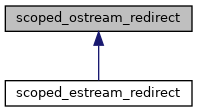#include <iostream.h>
Inheritance diagram for scoped_ostream_redirect:

Public Member Functions | |
| scoped_ostream_redirect & | operator= (const scoped_ostream_redirect &)=delete |
| scoped_ostream_redirect & | operator= (scoped_ostream_redirect &&)=delete |
| scoped_ostream_redirect (const scoped_ostream_redirect &)=delete | |
| scoped_ostream_redirect (scoped_ostream_redirect &&other)=default | |
| scoped_ostream_redirect (std::ostream &costream=std::cout, const object &pyostream=module_::import("sys").attr("stdout")) | |
| ~scoped_ostream_redirect () | |
Protected Attributes | |
| detail::pythonbuf | buffer |
| std::ostream & | costream |
| std::streambuf * | old |
Detailed Description
\rst This a move-only guard that redirects output.
.. code-block:: cpp
#include <pybind11/iostream.h>
...
{
py::scoped_ostream_redirect output;
std::cout << "Hello, World!"; // Python stdout
} // <-- return std::cout to normal
You can explicitly pass the c++ stream and the python object, for example to guard stderr instead.
.. code-block:: cpp
{
py::scoped_ostream_redirect output{
std::cerr, py::module::import("sys").attr("stderr")};
std::cout << "Hello, World!";
}
\endrst
Definition at line 159 of file iostream.h.
Constructor & Destructor Documentation
◆ scoped_ostream_redirect() [1/3]
|
inlineexplicit |
Definition at line 166 of file iostream.h.
◆ ~scoped_ostream_redirect()
|
inline |
Definition at line 173 of file iostream.h.
◆ scoped_ostream_redirect() [2/3]
|
delete |
◆ scoped_ostream_redirect() [3/3]
|
default |
Member Function Documentation
◆ operator=() [1/2]
|
delete |
◆ operator=() [2/2]
|
delete |
Member Data Documentation
◆ buffer
|
protected |
Definition at line 163 of file iostream.h.
◆ costream
|
protected |
Definition at line 162 of file iostream.h.
◆ old
|
protected |
Definition at line 161 of file iostream.h.
The documentation for this class was generated from the following file: